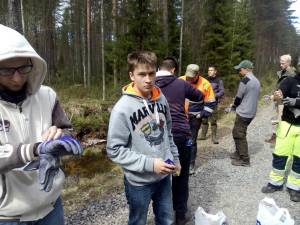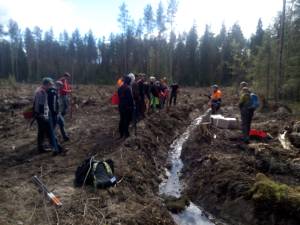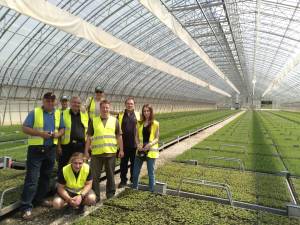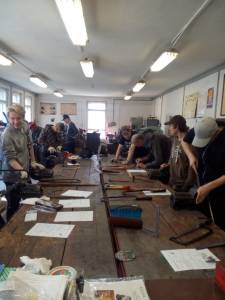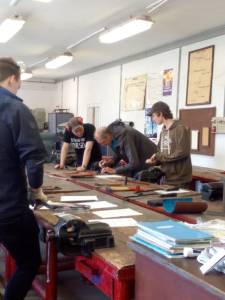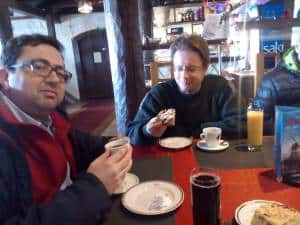Stratégiai Partnerségi Programok
Projekt kódja: 2020-1-DK01-KA202-075077
Projekt időtartama: 2021.01.01-2022.12.31
A projekt disszeminációs felülete ide kattintva érhető el:
https://erasdg.eu/
Facebook link
Projektismertető
This project has been inspired by the 17 Sustainable Development Goals (SDGs) of the United Nations. Regarding sustainability issues, there are 3 key problems:
1.
The problems are so overwhelming that individual people feel that they have no chance to make difference. Our students are acutely aware of the problems, yet they feel helpless.
2.
Vast problems require concrete changes in our behaviour, which is hard. It is much easier to point the finger at someone else. Very often, the blaming finger has been pointing to the agribusiness.
3.
The problems are so vast that no sector nor no single country can resolve them alone; we need to take a communal approach and learn from the good practices of others.
This project seeks solutions to these problems in our context: VET within the green sector. Instead of being part of the problem, the agribusiness sector needs to part of the solution.
The hope lies in young people and education, but we need to develop VET and tackle real-life issues communally and in international cooperation.
Therefore, this project has 3 main goals:
1.
To empower students to contribute to the SDGs. For this, we need
– learner-centred pedagogical approaches,
– to give them a positive experience of tackling issues communally, and in international cooperation,
– provide them with the skills and networks needed to continue to do so in the future.
2.
To empower students, teaching staff needs to be well-equipped to provide meaningful education for sustainability
– with the contribution of representatives from the world of work,
– using authentic, real-life learning challenges related to SDG 12 and 13,
– and innovative, learner-centred pedagogical approaches.
3.
We need to develop innovative sustainability solutions and share them, as well as other good practices, in our own regions and in the whole field.
The developing partners will arrange 4 workshops in which an innovative, learner-centred pedagogical approach is presented to the others in practice. During the workshops
international student teams tackle a real-life challenge that’s related to the SDGs and provided by regional stakeholders. This enables the students to increase key competences such
as communication, problem-solving, teamwork, and boundary-crossing skills, and to network with their future European colleagues while inspiring them to solving problems in
European cooperation and empowering them.
The workshop allows the teachers to learn the innovative pedagogical approach and evaluate how it should be localized to better fit their own context. To disseminate the pedagogical
approaches wider, we will develop Manuals. The Manuals will be tested by 4 testing partners. Each will arrange a workshop in their own country piloting one approach, which will
provide direct feedback on the transferability of the pedagogical approaches and on the usefulness of the Manuals.
The aspect of sharing good practices will also be covered in the workshops: At least 2 innovative sustainability solutions from regional stakeholders will be shared. This will inspire the
students and widen the knowledge of the teachers. We will collect these good practices to support the dissemination among regional stakeholders in each country. In addition, we will
collect the real-life learning challenges tackled during the workshops and the solutions developed by the student teams. These provide good practices and inspiration to other farmers.
In addition, they will serve as teaching material as such for other VET providers within the green sector.
The Intellectual Outputs will be disseminated by each partner according to our carefully designed dissemination strategy. The VET providers in the green sector being very well
organized both at national and European level through the Europea International network. Therefore, this project has a good chance to reach considerable sectoral impact:
– Our students will be empowered to become ambassadors of sustainability engaging in active citizenship regarding sustainability issues.
– The 4 innovative pedagogical approaches will spread to other schools in Europe, improving the quality of VET in the green sector.
– Green VET schools will involve companies, regional authorities and other stakeholders so students can contribute to tackling environmental problems together, thus improving the
labour market relevance of VET and enhancing its attractiveness in the eyes of the students.
– Good practices and innovative solutions in the field of sustainability will spread between schools, stakeholders such as companies, professional bodies, municipalities, regions and
countries. On a long term, this will help the agribusiness to develop in a future-proof way, in line with EU policy.
All in all, this project will, for its part, contribute to the achievement of the European and global sustainability goals in the green sector and develop the quality and attractiveness of
VET.
Dissemination activity:
Legyen partnerünk!
A nourish eu egy, az Erasmus+ által támogatott projekt egészséges és változatos táplálkozási régiók kialakításáért. Munkánk során az élelmiszeriparban dolgozó kis – és középvállalkozásokat segítjük üzleti, marketing, termelési és fejlesztési innovációk bevezetésében.
Weboldalunkra itt, míg a Facebook közösségi portálon itt talál ránk.
Projekthírlevelek:
Játsszon velünk!
A PLENTIS projekt célja hogy játékos formában segítsen a diákoknak a tanulásban, a tanároknak pedig a tanításban. A projektet megvalósító partnerség egy online oktatójáték gyűjteményt kínál a felhasználóknak, melynek központjában a mezőgazdasági vállalkozások állnak. A játékok célja az ehhez a szektorhoz tartozó kompetenciák fejlesztése.
The PLENTIS project would like to help you learning if you are a student, or help you teaching if you are a teacher/trainer in the form of games. The partnership of this project offers a set of online educational minigames in the topic of agricultural entrepreneurship in order to develop the entrepreneurial skills and competences of students of this vocation.
Óvja a jövőt velünk!
Olyan eszközöket, módszereket kínálunk a szakképzésben dolgozó tanároknak, amelyek segítségével felkelthetik tanulóik érdeklődését a bio-alapú gazdasággal kapcsolatos ismeretek iránt, “zöld” gondolkodásra késztethetik tanítványaikat és ezt beépíthetik mindennapos személyes és szakmai életükbe is.

Program description
The contracting period of the project is: 1/09/2015-31/08/2017
The International Forestry program (financed from the Erasmus+ KA02 program budget) started in the autumn of 2015. The coordinator institute of the project is the Vocational Education Centre Sedu (Koulukatu 41, FIN-60100 Seinäjoki, Finland).
THE OUTCOMES
The aim of the project is to create a curriculum for vocational training that is called International Forestry. Each participant country has to implement the study curriculum in their schools and disseminate the material nationally. Every school will create a forestry eLearning module. As part of the International forestry curriculum we will also create a real life extensive course carried out on the spot (Finland, Estonia, Sweden, Hungary, Austria) in English for students from the participating countries. The mobility part of the module will concentrate on national forestry and it will be designed for the foreign students. We will also create a template for expert visits in our schools alongside with the students’ visits. With each country’s contribution we will establish the curriculum called International Forestry.
The e-learning material is available online in English. The material covers modules in connection with forestry and nature, nature conservation. Each participant country manages one module. This means that the participants prepare and co-ordinate their own e-learning materials.
The modules are the following:
The structure of International Forestry unit:
I.
e-Learning module
II.
Outdoor recreation – Forests in Focus.
III.
The national parks. National parks are extensive nature conservation areas with the major task of ensuring biodiversity and giving people the opportunity to relax and enjoy nature. Country specific features of national parks in Austria, Estonia, Finland, Sweden and Hungary.
IV.
Everyman’s rights: Austria, Estonia, Finland, Sweden and Hungary. Finland and Hungary in charge of section A.
Hungary’s contribution to the e-learning module: preparing learning material about national parks, elaboration of the national park topic structure with questions that can be used as guidelines while collecting information in the participant countries.
We set up the most important viewpoints and basic information in connection with national parks that are independent from location. This means every country can use these guidelines while giving information about national parks. These were: the aim of national parks, typical data of national parks (area, year of foundation etc.) and measures of biological diversity, description of local natural and cultural specialties.
Decisions about forest management on national and international level are based on the sum of stand parameters in the country. The Estonian partner will give the approach of Estonian forest typology, with a comparison to partner countries on the basis of information they provide on types.
The term “sustainable forest management“ can be defined as “the permanent and optimized use of all forest-related goods allied with the increase of the beneficial and welfare function of forests for present and future generations.”
Forests are very sensitive ecosystems. Thus, it has to be kept in mind that only a regenerative forest can fulfill the requirements of sustainability. An exclusive environmentally friendly use of forests leads to success in the sense of sustainability. However, hard-to-reach areas, unfavorable weather conditions, and the fact that technical devises and equipment are restricted in their use can complicate a sustainable management. The progress on the field of technology facilitates the work, thus enabling a moderate but steady regeneration. Alongside timber production forests also serve as air filters, oxygen producers, reservoirs, protection, habitats and many more. Only a sustainable forest management can form a basis for future multi-functional forests.
Besides creating an e-learning material the project has a mobility program, too. During the mobility program 4 students plus 1 or 2 teachers of each participant country travels to each location (each school of the participants) where they spend a week. During the 5-day program the students achieve practical knowledge.
The practical modules of the countries are the following:
The practical training contains the following field of education:
1) Austria: Timber management on hardly accessible areas
2) Estonia: Practical forest management topics with field works
3) Finland: Valuable forest habitats
4) Hungary: Traditional forestry mechanics
5) Sweden: Safety regulations about chainsaw work and clearing saw work. Students receive chain saw driver’s licence.
This will support national forest industry as well as provide schools and companies a common platform for co-operation which serves both the interests of schools and companies.
Programs as planned:
1. Transnational project meeting in Finland. (October 2015)
Tasks: Goals, administrative and financial aspects to be clarified. A common structure for the eLearning module in international forestry. Forest industry expert (Metsä Group) to be invited for contribution based on the needs of the working life.
2. According to the drafted plan, each partner will produce a module for the internet based learning module on the topic agreed.
Projekt kódja: 2015-1-HU01-KA202-013555
Projekt időtartama: 2015. 09.01 – 2018.08.31
Projekt rövid összefoglalása:
A projekt célja a „megfordított tanterem” módszerének meghonosítása gyakorló pedagógusok intenzív bevonásával a partnerországok szakképző iskoláiban. A szakképzés minőségének javítása, a munkaalapú oktatás fejlesztése korszerű IKT eszközök eredményesebb alkalmazásával.
Megjelent cikkek/disszemináció:
http://europea.org/why-dont-you-just-flip-it/
KMASZC.HU
F E L T Ö L T É S
A L A T T
A projektről:
Digital Culture for the 21st Century Vocational Education and Training
2020-1-HU01-KA202-078760
2020.09.01-2023.05.31.
Disszeminációs felület: https://vetwork.prompt.hu/
Résztvevő iskola:
Közép-magyarországi ASzC Magyar Gyula Kertészeti Technikum és Szakképző Iskola
Nem mondhatjuk, hogy nincsenek lelkes pedagógusok, hogy ne élne ma is tanári elhivatottság, saját tapasztalatunkból tudjuk, hogy az országban, a szakképzésben mennyi az új módszerek tanulására, szakmai tovább fejlődésre kész pedagógus, akik örömmel és lelkesen vesznek részt új digitális eszközöket, módszereket kínáló képzésekben.
Miért van mégis az, hogy ha a visszajelzések alapján kifejezetten eredményesnek mondott digitális módszertani képzést követően egy év múlva rákérdezünk, hogy hány pedagógusnak sikerült napi szinten beépítenie a módszert a munkájába, azzal szembesülünk, hogy jó, ha ez az arány a résztvevők 10-15%-a?
A projekt célja a hagyományos digitális módszertani pedagógustovábbképzési program szélesebb kontextusba ágyazása, testreszabott, iskolában zajló kontakt képzés megszervezésével, összekapcsolva az intézményi szintű digitális kompetenciát és minőségkultúrát erősítő szervezetfejlesztési komponensekkel.
Projekt eredmények:
Digitális étlap
https://vetwork.prompt.hu/hu/results/digital-menu-card
Eszköztár Digitális Pedagógiai Stratégia megalkotásához
https://vetwork.prompt.hu/hu/results/toolkit-developing-digital-pedagogy-strategy
Projekttalálkozók
Kassa – 2022.06.08-09.
A Vetwork (Digital Culture for the 21st Century Vocational Education) Erasmus projekt keretében a kollégák Kassán találkoztak, ahol megbeszélték az utolsó hónapok feladatait.
A megbeszélésen a Közép-magyarországi ASzC Magyar Gyula Kertészeti Technikum és Szakképző Iskola 2 oktatója, Ekert Sára és Stump Krisztina vettek részt.
Nagyvárad – 2022.11.03-04.
A Vetwork (Digital Culture for the 21st Century Vocational Education) Erasmus+ projekt keretében a kollégák Nagyváradon találkoztak, ahol megbeszélték az aktuális projektfeladatokat, beszámoltak az eddigi munkáról.
A legfontosabb feladatok voltak:
– tanári workshopok alatt kapott visszajelzesek értékelése
– a diákoknak tartott digitális órák és a DMC [Digital Menu Card] felület használhatóságának vizsgálata
– munkaszakaszok és feladatok megbeszélése, az eddigiek értékelése és a célok kitűzése.
A megbeszélésen a Közép-magyarországi ASzC Magyar Gyula Kertészeti Technikum és Szakképző Iskola 2 oktatója, Ekert Sára és Stump Krisztina vettek részt.
GreenVeu – Recruitment for the Worlds of Green
A GreenVEU Erasmus+ stratégiai partnerségi projekt hat európai ország együttműködésében valósul meg, célja pedig a zöld szektor iránt érdeklődő célcsoportok azonosítása és megszólítása. A projekt innovatív stratégiákat fejleszt a mezőgazdasági szakmák népszerűsítésére, valamint hosszú távú együttműködést épít ki az agrárszakképzés szereplői – iskolák, helyi közösségek, vállalkozások és képzési partnerek – között. A GREENVEU projekt elhivatottan dolgozik azon, hogy innovatív toborzási stratégiák segítségével vonzóbbá tegye a zöld szakmákat a szakképzésben (Green VET).
A projektben a Közép-magyarországi Agrárszakképzési Centrummal közösen a következő európai országok szervezetei dolgoznak együtt:
- Katapult / Platform Talent for Technology (Hollandia)
- Green Academy / Jordbrugets UddannelsesCenter Århus (Dánia)
- Federación EFAS CV La Malvesia (Spanyolország)
- WorldSkills Romania Foundation (Románia)
- Viherympäristöliitto ry (Finnország)
A GREENVEU projekt a fenntarthatóság és a zöld szakmák jövőjének formálására törekszik egy inspiráló történetekből épített toborzási rendszer segítségével. A zöld innováció határokon átnyúló lehetőségeket kínál, legyen szó megújuló energiáról, ökotechnológiáról, fenntartható mezőgazdaságról vagy zöld vállalkozásokról. A GREENVEU ezekbe a dinamikus területekbe vezeti be a fiatalokat és a második karriert kezdőket, segítve őket abban, hogy megtalálják helyüket a fenntartható jövőben.
Fő célkitűzéseink
- a résztvevő országok célcsoportjainak motivációinak és értékeinek megismerése,
- a zöld szakmák iránti érdeklődés növelése az agrárképzésben,
- hosszútávú együttműködés kialakítása a szakképzés szereplői, a helyi közösségek, vállalkozások és képzési partnerek között.
Kutatás és célcsoportok
A Motivaction (Hollandia) kutatási szakértőinek segítségével a GREENVEU partnereivel kvalitatív és kvantitatív kutatásokat végeztünk, hogy pontosan meghatározzuk a zöld szektorok iránt érdeklődő célcsoportokat. Az eredmények alapján a partnerek egyedi régiós toborzási stratégiát dolgoztak ki.
Innovatív toborzási stratégiák
A projekt keretében olyan toborzási stratégiákat alakítunk ki, amelyek figyelembe veszik a célcsoportok érdeklődését és motivációit. Ehhez élményszerű történetmesélést, inspiráló videókat és interaktív tartalmakat készítettünk.
Nyílt hozzáférésű eszköztár
A projekt során fejlesztett tudás, eszközök és jó gyakorlatok minden európai szakképző intézmény számára elérhetőek a projekt online toborzási eszköztárában angol nyelven.
Tanulási Közösségek
A GREENVEU tanulási közösségéhez Ön is csatlakozhat! Rendszeresen megrendezésre kerülő hazai és nemzetközi eseményeinken lehetőség nyílik kapcsolatépítésre és tapasztalatcserére a zöld szektor iránt elhivatott szereplők között. Várjuk iskolák, helyi közösségek, döntéshozók és vállalkozások csatlakozását, hogy közösen fejlesszük a zöld szakmákhoz vezető utakat, és hozzájáruljunk egy fenntarthatóbb jövő megteremtéséhez.














